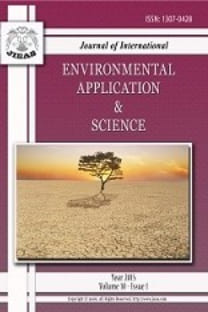Study the Efficiency of two waste Treatment Plants in the Al-Karkh and Al-Rusafa of Baghdad Region in 2015
Study the Efficiency of two waste Treatment Plants in the Al-Karkh and Al-Rusafa of Baghdad Region in 2015
wastewater treatment plants river contamination,
___
Al-Any HJ, (2000) River water pollutants and its impact on the environment. The 1st Conference on the environmental and methods to protect from pollution.5-6/ 11/ 2000. 306-318.Al-Dulaimi MA, (2015) Physical and chemical characteristics of treated water of Rustamyiah sewage treatment plant and the efficiency of treatment methods. MSc. Theses, University of Baghdad. Pp.98.
Al-Zehairy MS, (2008) Future evaluation of the efficiency of the performance of wastewater treatment plants in the Baghdad city. Technical Journal. 21(1): 14-23. (In Arabic).
Ali ZH, Salman KAbd, Abd-Alateef KA, (2001) Evaluating the efficiency of the filter in Al-Rustamiya wastewater treatment plant. Almustansriyah J. 12, 200-212.
American Public Health Association (APHA) (2012), Standard methods for the examination of water and wastewater. 22nd ed. Washington DC.
Andew S, Harum J, Jonathan S, Robert B, (2003) Municipal wastewater treatment evaluating improvments in national water quality. John Wiely and Sons Inc. New York: 17-35.
Baghdad Municipality, (2010) Baghdad sewer department, The old Rustamyiah wastewater treatment plant, Brief on Rustamyiah project. Pp.84. (In Arabic).
Baghdad Municipality, (2014) Baghdad sewer department, Department of Designs, Division of Geographic Information (GIS). (In Arabic).
Bashy NY, Alabd Rabah WM, (2000) Finding efficient removal using activated sludge with a long-term ventilation. J. of Environmental and Sustainable development Research. 3, 82-86.
Brands HJ, Tripke E, (1982), Water manual. Vulkan-Veriag,Essem. pp.320
Davis P S (2005), The biological basic of wastewater treatment. Strath Kelvin Instruments.
Francis W (1962), Boiler house and power station chemistry. Edward Arnold LTD. London, Pp. 434.
Henze M, (2008) Biological wastewater treatment:principles modeling and design, IWA publishing, London,Uk.
Musa S A (2009) Study the effects of disposing Rustamiyah treatment plant effluent on some physical and chemical characteristics of river Diyala. College of Science, Babylon Unv.. 14th Scientific Conference.
Rasheed KA, Sabri AW, Shahatha HA, (2000a) Study of the physical and chemical properties of the lower part of the Tigris and Diyala rivers south of Baghdad. Diyala J. of Appl. Sci. 2, 95-104.(in Arabic)
Rasheed KA, Sabri AW, Shahatha HA, (2000b) The distribution and spread of zooplankton in the lower part of the Tigris and Diyala rivers south of Baghdad. Diyala J. of Appl. Sci. 2, 1-10. (in Arabic)
Rasheed KA, Sabri AW, Al-Lami AA, Sabti HA, Kassim TI, (2000c) The effect of Diyala river on the Tigris river:Distribution and spread of benthic fauna. The 1st Conference on the environmental and methods to protect from pollution.5-6/ 11/ 2000. 56-64. (in Arabic)
Sabri AW, Ali ZH, Rasheed KA, (2000) The effects of Gulf war on Iraq: Biological contamination. The 1st Conference on the environmental and methods to protect from pollution.5-6/ 11/ 2000. 663-672. (in Arabic)
- ISSN: 1307-0428
- Yayın Aralığı: Yılda 4 Sayı
- Başlangıç: 2006
- Yayıncı: Selçuk Üniversitesi
Lorena CİKO, Adelaida ANDONİ, Fatos YLLİ, Ervisjana PLAKU, Krenaida TARAJ
O.w. MAKİNDE, T.a. ADESİYAN, İ.o. OLABANJİ, İ.a. TUNBOSUN, K.t OGUNDELE, O. ADELOWOTAN, E.a. OLUYEMİ
Sadija KADRİU, Mehush ALİU, Milaim Sadiku, Mensur KELMENDİ, İsmet MULLİQİ, Sabri HAJDİNİ
Accumulation of Copper and Zinc in Sediments of Tigris River at Baghdad City
Muhammad N. AL-AZZAWİ, Muhanned R. NASHAAT, Dhea′a S. AHMED
Using Beautiful Flowering Bulbous (Geophytes) Plants in the Cemetery Gardens in the City of Tokat
Kübra Yazici, Hasan Köse, Bahriye GÜLGÜN
Afrim KOLİQİ, Nurten DEVA, Albana KOLİQİ
Sadija KADRİU, Mehush ALİU, Milaim Sadiku, Mensur KELMENDİ, İsmet MULLİQİ, Sabri HAJDİNİ
